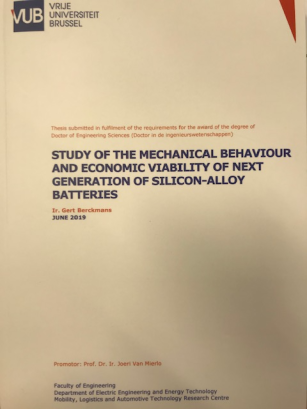
The usage of fossil fuels has led to the pollution of large and modern cities, and causes global warming with massive consequences to the earth's climate. The negative impact of the automotive industry on the air quality in cities change can be addressed by changing from fossil driven vehicles towards battery electric vehicles with no tailpipe emissions. However, their adoption mainly depends on the willingness to pay for the extra cost of the traction battery combined with the acceptance of their limited driving range. The growing custome needs for cheaper and more energy dense batteries push the energy industry to continuously innovate. Throughout this PhD the mechanical behaviour and the economic viability of next generation silicon-alloy batteries is investigated. full battery pouch cells with high weight fractions of silicon (55% Si-alloy) haven't been reported in literature. The economic viability is investigated by using an innovative approach based on complementing process-based cost calculations with learning curves to take into account the maturing of the market. This methodology will allow to make cost predictions up to 2030 of state of the art and silicon-based lithium-ion batteries. To analyse its mechanical behaviour, an innovative set-up has been developed allowing to quantify pressure and swelling variations during an extensive electrical chracterisation campaign. This campaign proves that internal pressure in the battery body is anon-negliguible parameter which has to be considered when designing packs or systems (a pressure increase of 29% has been observed during cycling over the whole state of charge range). Additionally, a model of the mechanical behaviour of an electrode particle has been developed, which allows to identify which are the determining parameters that influence the mechanical behaviour.
This PhD uses an innovative methodology by investigating both the economic viability and the mechanical behaviour to help this technology towards mass production adoption.
